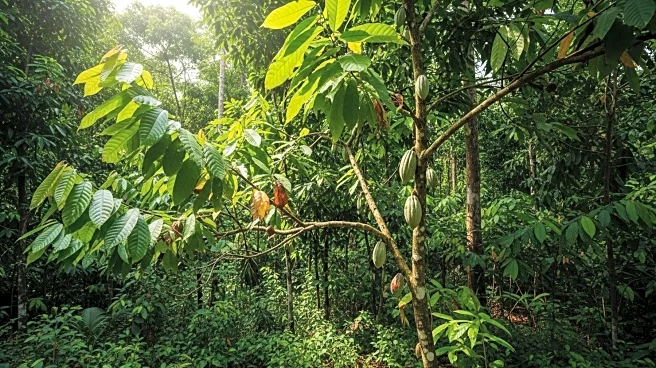What is the story about?
What's Happening?
The European Union Deforestation Regulation (EUDR) is set to impose strict traceability requirements on cocoa supply chains, demanding that chocolate manufacturers trace their products back to the source. The Rainforest Alliance has identified several challenges in achieving this traceability, including the lack of centralized buying among cocoa farmers, the complexity of supply chains, and the presence of middlemen known as coxeurs. These factors complicate efforts to track cocoa beans from farm to final product. Additionally, while satellite technology offers a high-tech solution for monitoring deforestation, it faces limitations that require complementary ground data for effective traceability.
Why It's Important?
The EUDR aims to combat deforestation by ensuring that products entering the EU market are sourced sustainably. For cocoa manufacturers, compliance with these regulations is crucial to maintaining market access. The challenges outlined by the Rainforest Alliance highlight the need for improved transparency and record-keeping within the cocoa industry. Failure to address these issues could result in significant economic repercussions for cocoa producers and manufacturers, potentially affecting supply chains and market dynamics globally.
What's Next?
To overcome these traceability challenges, cocoa manufacturers may need to invest in digital traceability systems and collaborate with NGOs and local governments to enhance data collection and validation. Training and incentivizing coxeurs to maintain better records could also be a critical step. As the EUDR deadline approaches, stakeholders in the cocoa industry will likely intensify efforts to align their practices with regulatory requirements, potentially leading to innovations in supply chain management and traceability technologies.
Beyond the Headlines
The push for traceability in cocoa supply chains may have broader implications for ethical sourcing and sustainability in the food industry. It could drive a shift towards more transparent and accountable practices, influencing consumer expectations and corporate responsibility standards. Additionally, the integration of satellite and ground data could set a precedent for other agricultural sectors facing similar traceability challenges.















